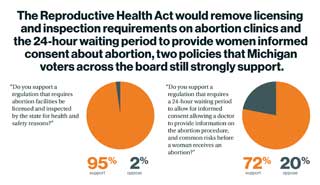Lansing Update: Abortion Deregulation Bills Advance Despite Widespread Opposition from Michigan Voters
Posted October 20, 2023
Majority of Senate Votes for RHA, Chooses Abortion Industry Over Health and Safety of Women
The Michigan Senate this week voted to approve the Reproductive Health Act (RHA) in party-line votes even after new statewide polling was released continuing to show strong voter support for the abortion limits the RHA would repeal.

After taking testimony last week, the Senate Housing and Human Services Committee this week voted along party lines to advance five bills tied to the RHA. The full Senate then voted along party lines to approve four of those bills — Senate Bills 474 through 477 — and send them over to the House.
A House package of RHA bills is also on the floor in that chamber, where there is at least one majority party member and likely others who still do not support this proposal.
Michigan Catholic Conference (MCC) issued statements to the press in response to both votes this week. In a statement Thursday after the full Senate vote, MCC argued the Senate’s actions “do nothing to benefit women or protect their well-being,” and simply “inoculates abortion businesses from minimal levels of transparency and accountability.”
Before the Senate votes this week, the results of a new statewide poll conducted by Marketing Resource Group (MRG) and commissioned by MCC and Right to Life of Michigan were released. The poll confirmed that Michigan voters continue to strongly support the abortion limits proposed for repeal in the RHA, including the 24-hour waiting period and state licensing and inspections requirements for abortion clinics.
The poll conducted in early October found that 95% of Michigan voters support state licensing and inspection requirements for abortion clinics and 72% support the 24-hour waiting period. Both policies would be repealed if the RHA were passed and signed into law.
The results of the poll were distributed to lawmakers ahead of the votes and publicized to the media by MRG. MCC also highlighted the poll in a press release issued following the committee vote, arguing that Senate committee members who voted for the legislation were siding with the abortion industry over the will of most Michigan voters on abortion limits.
“Michigan voters continue to voice support for common-sense limits on abortion that protect the health and safety of the women who have an abortion,” said Rebecca Mastee, J.D., policy advocate for MCC, in the statement. “The RHA would repeal these protections to the detriment of Michigan women. Lawmakers who support this package stand against the will of Michigan voters, including those who voted for Proposal 3.”
The poll results include 55% of people who said they voted in support of Proposal 3. Of those who voted yes, only 45% voted for the proposal because they favor abortion on demand. Nearly every Proposal 3 voter — 98% — support keeping licensing and inspections for abortion clinics and 68% support keeping the 24-hour waiting period for informed consent.

The poll also found a majority of voters still back parental consent requirements for minors’ abortions, a ban on partial-birth abortions, and preventing taxpayers from having to pay for abortions through Medicaid. Those policies, while favored by abortion advocates, did not move forward as part of the RHA bills voted on by the Senate.
The responses in the October MRG poll were similar to a poll conducted earlier this year by MRG and commissioned by MCC that asked similar questions on the abortion limits, establishing the consistent support of Michigan voters for common-sense limitations on abortion, even after passage of Proposal 3.
MCC and other partners continue to speak to House members, making the case that the RHA would harm the health and safety of vulnerable women in Michigan and is out of step with the will of Michigan voters.
A critical component to MCC’s advocacy has been the participation of grassroots advocates like you, as more than 6,000 messages have been sent to lawmakers in the past two months urging them to oppose the RHA. If you have not yet, click or tap here to send a quick message to your state representative urging them to oppose the RHA.
Thank you for letting your lawmakers know where you stand and why this legislation is poor public policy for the state of Michigan.
MCC References Church Attacks in Advocacy for Stronger Vandalism Penalties
Attacks on at least eight Catholic churches or facilities in Michigan and the hundreds that have occurred nationwide were presented by MCC to state senators this week, who are considering legislation that specifically criminalizes the vandalism of a church or sacred space.
House Bill 4476, sponsored by Rep. Noah Arbit (D-West Bloomfield), and House Bill 4477, sponsored by Rep. Ranjeev Puri (D-Canton), specifically makes a crime the act of vandalizing or threatening to vandalize a church or other religious space, and prescribes penalties based on the dollar amount of the destruction. The bills were up for consideration in the Senate Civil Rights, Judiciary, and Public Safety Committee this week after having previously cleared the House and receiving wide bipartisan support.
MCC has offered support for the bills in the hopes that increased penalties for such criminal acts may serve as a greater deterrent to them. MCC provided to the committee a list of documented attacks on Catholic churches in Michigan, including Holy Family Catholic Church in Grand Blanc, St. Mary’s Catholic Church in Royal Oak, and several instances in the Lansing area, including Church of the Resurrection, St. Thomas Aquinas Parish School, and Lansing Catholic High School.
There have been at least 288 incidents of vandalism at Catholic churches across 43 states and the District of Columbia since May 2020, according to the U.S. Conference of Catholic Bishops (USCCB).
The bills did not receive a vote this week from the Senate committee.
Governor Signs Bills to Ensure Safe Water in Schools, Daycares
Gov. Gretchen Whitmer signed a package of bills that will ensure safe drinking water is available in schools — including nonpublic schools — as well as in daycare centers.

The legislation would require schools to install filtered bottled water-filling stations and filtered faucets as part of a clean water drinking management plan the schools must submit to the state. Water outlets that are not filtered would need to be shut down. The legislation also stipulates the Legislature must cover the costs of the installation of water filtration systems.
MCC has been offering support for the measures throughout the legislative process to promote access to clean water and commends public officials for including nonpublic schools in the bills.
The bills signed into law include House Bill 4341, sponsored by Rep. Ranjeev Puri (D-Canton), House Bill 4342, sponsored by Rep. Cynthia Neeley (D-Flint), and Senate Bill 88, sponsored by Sen. Sylvia Santana (D-Detroit).
Bill Presenting Religious Freedom Concerns Signed by Governor
Legislation to enact the Affordable Care Act on the state level was signed into law this week without exempting religious employers from having to pay for contraception services as part of their employee health plans.
MCC had expressed concerns about this to a Senate committee before they voted on House Bill 4623, sponsored by Rep. Matt Koleszar (D-Plymouth) which was signed into law by Gov. Gretchen Whitmer this week.
On the federal level, an exemption exists that protects entities from “establishing, maintaining, providing, offering, or arranging for… coverage or payments for some or all contraceptive services” contrary to entities’ “sincerely held religious beliefs.”
This exemption was not included in the state legislation, prompting MCC to warn lawmakers that litigation with the state will likely be necessary to enforce constitutional rights to religious liberty and those recognized by the federal exemption.
Senate Votes to Improve Protections for Crime Victims
The full Senate provided bipartisan support for a series of bills to improve the rights of crime victims.
House Bills 4420 through 4423 are supported by MCC in accordance with promoting restorative justice by respecting the rights of crime victims. The legislation includes changes such as allowing crime victims to make their victim impact statements remotely and allowing them to have their faces blurred in certain court proceedings.
Overhaul of State’s Juvenile Justice System Advances in the House
The House this week passed several bills to help improve the juvenile justice system, including several bills the MCC supports.
The action in the House comes after the Senate last week approved other portions of an expansive legislative package that makes numerous reforms to the juvenile justice system in Michigan.
MCC is supporting this initiative to promote restorative justice practices for juvenile offenders and their families. The following bills that passed the House this week received MCC support:
- House Bill 4625
- Expands juveniles’ eligibility for diversion so that more low-risk youth are eligible for pre-court diversion from jail.
- House Bill 4626
- Shortens the duration of supervision to no more than 3 months for youth on diversion, as research shows that low-risk youth should not be over-supervised.
- House Bill 4628
- Requires the use of risk and mental health screening tools to inform decisions on placing youth on the consent calendar.
- House Bill 4629
- Requires courts to use a validated detention screening tool to inform decisions on placing youth in secure detention.
- House Bill 4630
- Expand Michigan’s Indigent Defense Commission Act duties to include indigent defense of youth to help in securing better public defense of juvenile offenders statewide.
- House Bill 4633
- Broaden the factors considered by courts before waiving a juvenile offender into the adult criminal justice system.
- House Bills 4636 and 4637
- Eliminates some fines and fees imposed on juveniles that are not related to restitution or the Crime Victims Fund.
- House Bills 4639, 4640, and 4643
- Updates references in state law to reflect a proposed new state Office of the Child Advocate.
